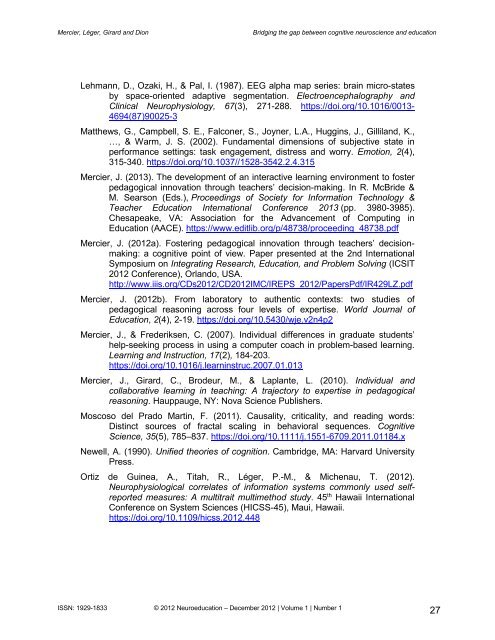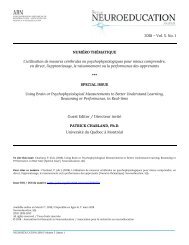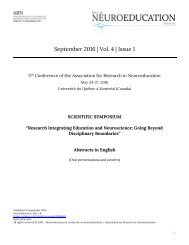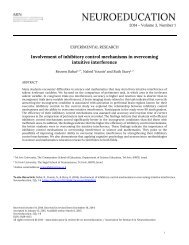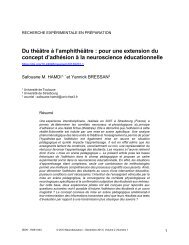Neuroeducation_2012_vol-1_no-1_full
Neuroeducation journal - Volume 1, Issue 1 (2012) - 144 pages
Neuroeducation journal - Volume 1, Issue 1 (2012) - 144 pages
You also want an ePaper? Increase the reach of your titles
YUMPU automatically turns print PDFs into web optimized ePapers that Google loves.
Mercier, Léger, Girard and Dion<br />
Bridging the gap between cognitive neuroscience and education<br />
Lehmann, D., Ozaki, H., & Pal, I. (1987). EEG alpha map series: brain micro-states<br />
by space-oriented adaptive segmentation. Electroencephalography and<br />
Clinical Neurophysiology, 67(3), 271-288. https://doi.org/10.1016/0013-<br />
4694(87)90025-3<br />
Matthews, G., Campbell, S. E., Falconer, S., Joyner, L.A., Huggins, J., Gilliland, K.,<br />
…, & Warm, J. S. (2002). Fundamental dimensions of subjective state in<br />
performance settings: task engagement, distress and worry. Emotion, 2(4),<br />
315-340. https://doi.org/10.1037//1528-3542.2.4.315<br />
Mercier, J. (2013). The development of an interactive learning environment to foster<br />
pedagogical in<strong>no</strong>vation through teachers’ decision-making. In R. McBride &<br />
M. Searson (Eds.), Proceedings of Society for Information Tech<strong>no</strong>logy &<br />
Teacher Education International Conference 2013 (pp. 3980-3985).<br />
Chesapeake, VA: Association for the Advancement of Computing in<br />
Education (AACE). https://www.editlib.org/p/48738/proceeding_48738.pdf<br />
Mercier, J. (<strong>2012</strong>a). Fostering pedagogical in<strong>no</strong>vation through teachers’ decisionmaking:<br />
a cognitive point of view. Paper presented at the 2nd International<br />
Symposium on Integrating Research, Education, and Problem Solving (ICSIT<br />
<strong>2012</strong> Conference), Orlando, USA.<br />
http://www.iiis.org/CDs<strong>2012</strong>/CD<strong>2012</strong>IMC/IREPS_<strong>2012</strong>/PapersPdf/IR429LZ.pdf<br />
Mercier, J. (<strong>2012</strong>b). From laboratory to authentic contexts: two studies of<br />
pedagogical reasoning across four levels of expertise. World Journal of<br />
Education, 2(4), 2-19. https://doi.org/10.5430/wje.v2n4p2<br />
Mercier, J., & Frederiksen, C. (2007). Individual differences in graduate students’<br />
help-seeking process in using a computer coach in problem-based learning.<br />
Learning and Instruction, 17(2), 184-203.<br />
https://doi.org/10.1016/j.learninstruc.2007.01.013<br />
Mercier, J., Girard, C., Brodeur, M., & Laplante, L. (2010). Individual and<br />
collaborative learning in teaching: A trajectory to expertise in pedagogical<br />
reasoning. Hauppauge, NY: Nova Science Publishers.<br />
Moscoso del Prado Martin, F. (2011). Causality, criticality, and reading words:<br />
Distinct sources of fractal scaling in behavioral sequences. Cognitive<br />
Science, 35(5), 785–837. https://doi.org/10.1111/j.1551-6709.2011.01184.x<br />
Newell, A. (1990). Unified theories of cognition. Cambridge, MA: Harvard University<br />
Press.<br />
Ortiz de Guinea, A., Titah, R., Léger, P.-M., & Michenau, T. (<strong>2012</strong>).<br />
Neurophysiological correlates of information systems commonly used selfreported<br />
measures: A multitrait multimethod study. 45 th Hawaii International<br />
Conference on System Sciences (HICSS-45), Maui, Hawaii.<br />
https://doi.org/10.1109/hicss.<strong>2012</strong>.448<br />
ISSN: 1929-1833 © <strong>2012</strong> <strong>Neuroeducation</strong> – December <strong>2012</strong> | Volume 1 | Number 1<br />
27


